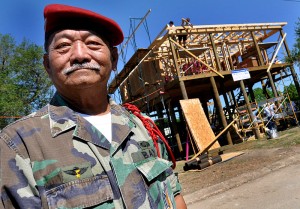I was moved recently when listening to a radio interview with a man who was rebuilding his house in the flattened city of Tacloban in the Philippines. He was amazingly upbeat, saying that he’d get his house back up in a few months, and was not going to be downcast by what had happened. I started to wonder what it is that can give some people such reserves of resilience in such a situation. The evidence is that many societies in a similar state of ruination have rebuilt themselves with remarkable speed, and even gone on to be more successful than they would otherwise because of the way that they have been forced to confront horrific conditions. Germany and Japan after the Second World War offer some remarkable examples.
The ability to not just remain unaffected, but actually benefit in the long run from unexpected disasters is one of the key themes of ‘Antifragile’, the book I’ve been reading by Nassim Nicholas Taleb. Taleb’s basic explanation of antifragility is that it comes from ‘having options’ – that is, being free (and able) to adopt a variety of strategies in changing conditions. The people who will be most badly hit by a disaster will be those without options. There will be some who do not have the physical capacity to reconstruct, not just their houses, but their lives. However, there will be others who are not able to do so because they are mentally stuck in an old model, and cannot adapt to a new one.
How would I fare in such a disaster? I really cannot know without experiencing it. My sister and her family were caught up in the Boxing Day tsunami of 2004, so I know a bit from her about how difficult post-traumatic stress can be, and how unexpected and long-lasting its effects. It is possible that some of those effects just depend on our ‘hard-wired’ physical reactions in ways that would be little affected by attitude. However, I can’t help thinking that at least some of our response to such scenarios must depend on how attached we are to fixed models of our environment, and beneath that to a sense of meaning that depends on things being a certain way. I would imagine that we can’t really believe that such a calamity has happened until we find it meaningful, and to find it fully meaningful we will have to detach ourselves from our previous models of our lives as secure. To detach ourselves in that way, we need a more basic sense of what is meaningful that does not depend on our beliefs about our situation.
That’s why, oddly enough, I suspect that it is things that many may regard as inessential pleasures that help to sustain us in these circumstances. I’m talking about the arts, and more widely about meaning as embodied in culture. If our basic sense of meaning is based in our bodies, and extends from these using metaphor to take in more abstract concepts, that sense of meaning is surely more likely to remain with us even during severe stresses. Perhaps your piano has been swept away by the typhoon and turned into matchwood, but the sense of meaning you got from playing it can still offer sustenance. If, on the other hand, your sense of meaning is based on beliefs about the success of a business that has now been ruined, or about a highly dependent relationship with one person who is now dead, it is much more vulnerable.
I’m sure that many people in the Philippines, a Catholic country, will also be turning to God to sustain them. Where God is a basic part of their experience connected to physicality, I expect he will, but where he is just a belief, there will be a like vulnerability. After the Lisbon Earthquake of 1755, many educated people across Europe with highly rationalised beliefs in God lost their faith. Metaphysical beliefs of all kinds are distinguished for their fragility, and it is extreme events like these that can break them.
Probably the most ruinous event that I can imagine happening to me personally would be the destruction, not of my house (tough though that would undoubtedly be), but of Middle Way Philosophy. If my view of the world suddenly proved to be wholly wrong, despite my best efforts to make it provisional and antifragile, that would be the real test. However, if I could overcome such trauma (which is of course always in doubt), I suspect it would be because of a basic confidence and sense of meaning which would not leave me because it would be a recognised part of my basic physical experience. Just as when one’s house is blown down, one still has the land and perhaps the materials salvaged from the wreckage with which to reconstruct it, so if one’s cognitive model is destroyed, one still has one’s bodily experience to provide the foundations, and the ability to create new metaphors as the material with which to build anew. Each time one rebuilds, perhaps, the metaphors will get a little better, a little sturdier and able to weather the next storm.
Picture: House being rebuilt after Hurricane Katrina (public domain)
